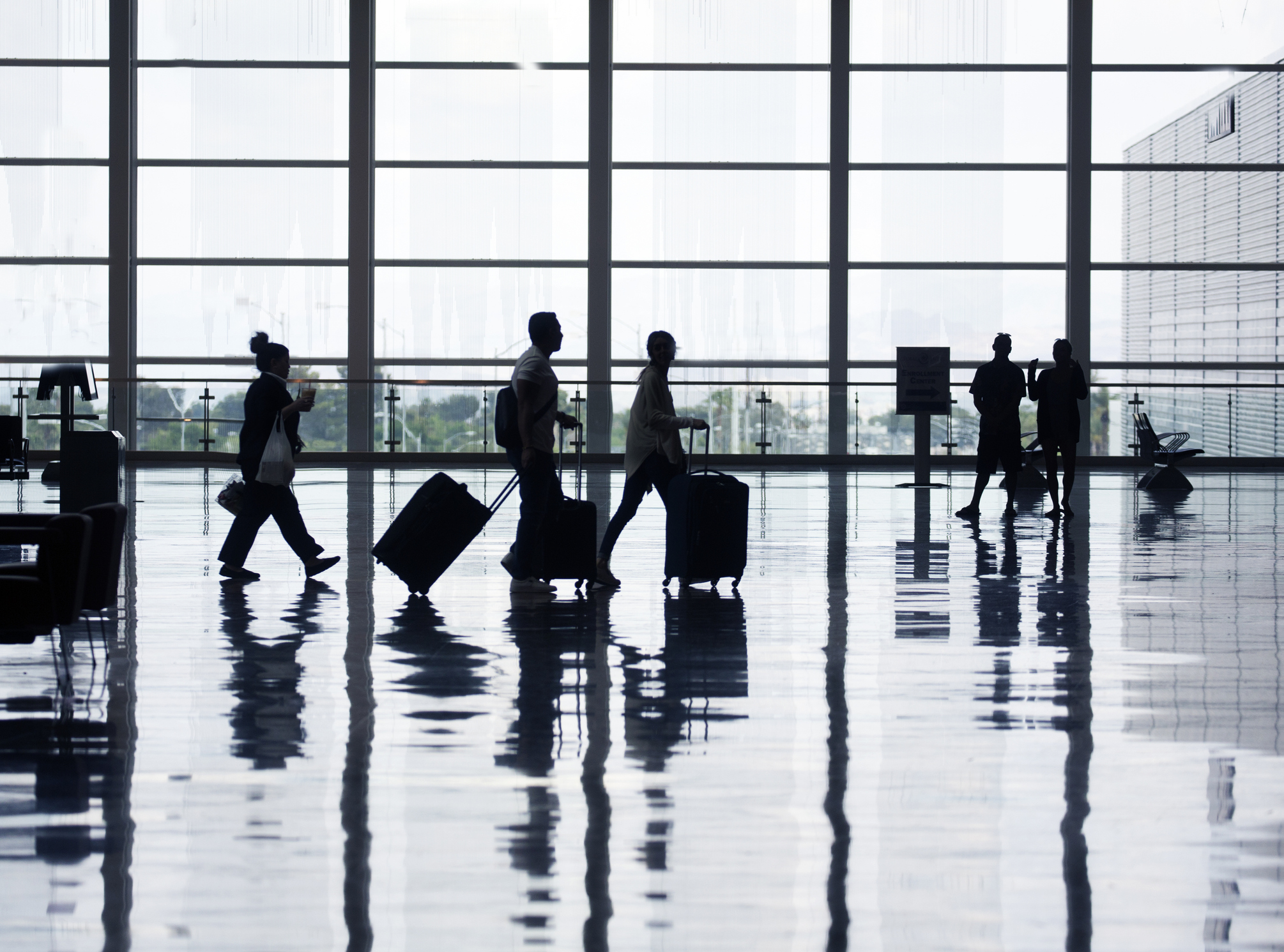A Plan To Hold Airlines Accountable For Damaging Wheelchairs Doesn't Go Far Enough, Groups Say
The proposal would make it easier to hold airlines accountable for mishandling wheelchairs and better protect people at airports and on planes, DOT says.


Profit and prosper with the best of Kiplinger's advice on investing, taxes, retirement, personal finance and much more. Delivered daily. Enter your email in the box and click Sign Me Up.
You are now subscribed
Your newsletter sign-up was successful
Want to add more newsletters?

Delivered daily
Kiplinger Today
Profit and prosper with the best of Kiplinger's advice on investing, taxes, retirement, personal finance and much more delivered daily. Smart money moves start here.

Sent five days a week
Kiplinger A Step Ahead
Get practical help to make better financial decisions in your everyday life, from spending to savings on top deals.

Delivered daily
Kiplinger Closing Bell
Get today's biggest financial and investing headlines delivered to your inbox every day the U.S. stock market is open.

Sent twice a week
Kiplinger Adviser Intel
Financial pros across the country share best practices and fresh tactics to preserve and grow your wealth.

Delivered weekly
Kiplinger Tax Tips
Trim your federal and state tax bills with practical tax-planning and tax-cutting strategies.

Sent twice a week
Kiplinger Retirement Tips
Your twice-a-week guide to planning and enjoying a financially secure and richly rewarding retirement

Sent bimonthly.
Kiplinger Adviser Angle
Insights for advisers, wealth managers and other financial professionals.

Sent twice a week
Kiplinger Investing Weekly
Your twice-a-week roundup of promising stocks, funds, companies and industries you should consider, ones you should avoid, and why.

Sent weekly for six weeks
Kiplinger Invest for Retirement
Your step-by-step six-part series on how to invest for retirement, from devising a successful strategy to exactly which investments to choose.
The Biden administration's recent move to mitigate less-than-stellar conditions for wheelchair users at airports has been long in coming and does not go far enough, two advocacy groups say.
The proposed rule would mark the biggest expansion of rights for passengers with wheelchairs since 2008, Department of Transportation (DOT) Secretary Pete Buttigieg said in a statement. It would make it easier to hold airlines accountable for mistreating wheelchairs and better protect people at airports and on planes, he said.
“There are millions of Americans with disabilities who do not travel by plane because of inadequate airline practices and inadequate government regulation, but now we are setting out to change that,” he said. “This new rule would change the way airlines operate to ensure that travelers using wheelchairs can travel safely and with dignity.”
From just $107.88 $24.99 for Kiplinger Personal Finance
Become a smarter, better informed investor. Subscribe from just $107.88 $24.99, plus get up to 4 Special Issues

Sign up for Kiplinger’s Free Newsletters
Profit and prosper with the best of expert advice on investing, taxes, retirement, personal finance and more - straight to your e-mail.
Profit and prosper with the best of expert advice - straight to your e-mail.
The proposal seeks to take action in several ways including by:
- Penalizing airlines for mishandling wheelchairs as automatic violations of the Air Carrier Access Act and holding them accountable when a passenger's mobility device is damaged.
- Providing more training for airport employees who assist passengers with mobility disabilities and in handling wheelchairs to ensure more prompt and effective assistance.
- Improving standards both on-board planes as well as when it comes to informing passengers about the whereabouts of their equipment when getting on and off the plane.
Just the beginning
Air travel for those who use wheelchairs can be notoriously perilous, as highlighted in a New York Times report last June. There has, however, been a push toward creating more accessibility at airports and in other industries.
But the government's proposal is just the beginning of the work that needs to be done to ensure safety and comfort for all travelers, Maria Town, CEO and president of the American Association of People with Disabilities, told Kiplinger.
"Right now, many disabled people choose not to fly because the risk of damage to the devices they rely on is too great," she said. "For those who do fly and have their wheelchair or scooter damaged in the process, traveling can result in injuries, high expenses and long wait times to fix the mobility aid — and even death."
The Biden administration's proposed rule-making to increase the safety and dignity of air passengers with disabilities "is both long overdue and an exciting point of progress in the ongoing fight for disability rights and inclusion," Town said. The training requirements, including requirements around repairing wheelchairs, as well as providing loaner chairs have the potential to improve the experiences of people with disabilities when they fly, she added.
Other steps that could be taken
Town also offered some insight into how the proposal could be more effective. Wheelchairs are not the only devices that become damaged or broken when disabled people fly. She said the administration should go beyond wheelchairs and consider other devices such as breathing machines and speech devices.
"The disability community is incredibly diverse, as are the devices we rely on to meet our day-to-day needs," Town said.
The administration's proposal accomplishes a goal of drawing attention to the barriers disabled airline passengers face but it does not go far enough, said John Morris, founder of wheelchairtravel.org, a nonprofit that aims to provide a wheelchair to people who who can't afford them.
"Through the proposal, the DOT will aim to codify long-held expectations, reiterating the responsibilities of airlines to repair damaged mobility equipment and adequately train their employees and contractors," Morris told Kiplinger. "Without a firm commitment to pursue enforcement action in response to violations, the updated regulations are unlikely to have any impact on the passenger experience."
Morris said it has been more than 30 years since the passage of the Air Carrier Access Act, but violations remain commonplace "and the DOT has done little to guarantee the civil rights of disabled passengers."
He called accessibility regulation "reactionary," and said that air travel "unnecessarily remains the least accessible form of transportation for wheelchair users."
Steps others are taking
In January, AccessibleGO,a travel search engine site catered to travelers with disabilities expanded its features to include options such as equipment rentals, flights, rental cars with hand controls, wheelchair van rentals, mobility rentals and concierge ride services for wheelchair-accessible vehicles.
The site also serves as a resource for travelers to find discounts on travel and engage with a community to discuss the level of accessibility of various cities and travel destinations.
In a separate move, Starbucks recently began to create a more accessible environment in all of its new stores. It recently opened a newly-designed store concept, complete with wider doors, portable, digital menus and more. You can take a virtual tour of the coffee chain's Washington, DC store, which was recently built using the company's inclusive spaces framework.
RELATED CONTENT
Profit and prosper with the best of Kiplinger's advice on investing, taxes, retirement, personal finance and much more. Delivered daily. Enter your email in the box and click Sign Me Up.

Jamie Feldman is a journalist, essayist and content creator. After building a byline as a lifestyle editor for HuffPost, her articles and editorials have since appeared in Cosmopolitan, Betches, Nylon, Bustle, Parade, and Well+Good. Her journey out of credit card debt, which she chronicles on TikTok, has amassed a loyal social media following. Her story has been featured in Fortune, Business Insider and on The Today Show, NBC Nightly News, CBS News, and NPR. She is currently producing a podcast on the same topic and living in Brooklyn, New York.
-
 5 Vince Lombardi Quotes Retirees Should Live By
5 Vince Lombardi Quotes Retirees Should Live ByThe iconic football coach's philosophy can help retirees win at the game of life.
-
 The $200,000 Olympic 'Pension' is a Retirement Game-Changer for Team USA
The $200,000 Olympic 'Pension' is a Retirement Game-Changer for Team USAThe donation by financier Ross Stevens is meant to be a "retirement program" for Team USA Olympic and Paralympic athletes.
-
 10 Cheapest Places to Live in Colorado
10 Cheapest Places to Live in ColoradoProperty Tax Looking for a cozy cabin near the slopes? These Colorado counties combine reasonable house prices with the state's lowest property tax bills.
-
 My First $1 Million: Retired Nuclear Power Plant Supervisor, 68, Wisconsin
My First $1 Million: Retired Nuclear Power Plant Supervisor, 68, WisconsinEver wonder how someone who's made a million dollars or more did it? Kiplinger's My First $1 Million series uncovers the answers.
-
 No-Fault Car Insurance States and What Drivers Need to Know
No-Fault Car Insurance States and What Drivers Need to KnowA breakdown of the confusing rules around no-fault car insurance in every state where it exists.
-
 7 Frugal Habits to Keep Even When You're Rich
7 Frugal Habits to Keep Even When You're RichSome frugal habits are worth it, no matter what tax bracket you're in.
-
 How Much It Costs to Host a Super Bowl Party in 2026
How Much It Costs to Host a Super Bowl Party in 2026Hosting a Super Bowl party in 2026 could cost you. Here's a breakdown of food, drink and entertainment costs — plus ways to save.
-
 3 Reasons to Use a 5-Year CD As You Approach Retirement
3 Reasons to Use a 5-Year CD As You Approach RetirementA five-year CD can help you reach other milestones as you approach retirement.
-
 How to Get the Fair Value for Your Shares When You Are in the Minority Vote on a Sale of Substantially All Corporate Assets
How to Get the Fair Value for Your Shares When You Are in the Minority Vote on a Sale of Substantially All Corporate AssetsWhen a sale of substantially all corporate assets is approved by majority vote, shareholders on the losing side of the vote should understand their rights.
-
 How to Watch the 2026 Winter Olympics Without Overpaying
How to Watch the 2026 Winter Olympics Without OverpayingHere’s how to stream the 2026 Winter Olympics live, including low-cost viewing options, Peacock access and ways to catch your favorite athletes and events from anywhere.
-
 Here’s How to Stream the Super Bowl for Less
Here’s How to Stream the Super Bowl for LessWe'll show you the least expensive ways to stream football's biggest event.